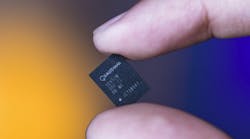Qualcomm, the world's largest maker of smartphone chips, was fined more than $270 million by the European Union for using predatory pricing to undercut rivals in the modem chip market a decade ago. The new penalty adds to the more than $3 billion in fines faced by Qualcomm over the last half decade for running afoul of antitrust regulations.
The European Commission said the company abused its dominance in the market for 3G modem chips, an older generation of baseband chips used to connect smartphones and other devices to the internet. The agency accused Qualcomm of selling chips to key customers for less than they cost to manufacture in an effort to eliminate rival Icera Semiconductor from 2009 to 2011. The startup said it had developed modem chips with higher overall data rates.
Qualcomm has long held a dominant position in the global market for baseband modems. Between 2009 and 2011, the company's market share in 3G modem chips totaled 60% or around three times the market share of its biggest rival. The company's vast portfolio of patents covering modern cellular communications make muscling into the market more difficult. Developing modem chips today also typically requires billions of dollars in R&D.
The European Commission said the company leveraged its market share lead to squash Icera before it became a bigger threat to its core baseband chip business. The agency said the plan was to prevent its smaller rival from growing by giving customers deep discounts. European regulators said that Qualcomm used predatory pricing with two Chinese customers, Huawei and ZTE, selling them modem chips from 2009 to 2011 for less than they cost to make.
"Qualcomm's strategic behavior prevented competition and innovation in the market," the European commissioner for competition, Margrethe Vestager, said in a statement. Her agency opened the probe in Qualcomm's predatory pricing tactics back in 2015.
Qualcomm disagreed. Don Rosenberg, the company's general counsel, said in a statement that its "alleged conduct did not cause anti-competitive harm" to the 3G market. Both customers highlighted in the case "said that they favored Qualcomm chips not because of price but because rival chipsets were technologically inferior," he said. Rosenberg also pointed out that the alleged violations occurred over "very short time period and for a very small volume of chips."
Qualcomm, the world's largest sixth largest chip supplier, is planning to appeal the penalty, which amounts to around one percent of the company's global sales of $22.7 billion last year but more than its total profit of $200 million. The company contends that the fine is "meritless" and "unsupported by the law, economic principles or market facts." Qualcomm also said it would hand over "a financial guarantee" as collateral while it fights to overturn the fine in court.
The fine is a slap on the wrist compared to the $1.2 billion penalty Qualcomm was ordered by the European Union to pay last year for antitrust abuses in the semiconductor space. Qualcomm was accused of paying Apple billions of dollars from 2011 to 2016 to only use its cellular modems for use in the iPhone and iPad, severely hampering rivals such as Intel. Qualcomm is in the process of appealing the fine, which amounted to around 5% of the company's 2018 sales.
The San Diego, California-based company has been besieged by international regulators in recent years. China forced the company to pay $975 million in 2015 for using unfair patent licensing practices with Chinese smartphone manufacturers. South Korea slapped it with fines of more than $850 million in 2017 for abusing its monopoly power to impose unfair patent royalty rates on companies using its chips in smartphones. Qualcomm has also faced hefty fines in Taiwan.
Customers have also hounded Qualcomm for using unfair business practices. The company's bruising legal battle with Apple centered on how its patent royalty rates are calculated. The companies, however, hammered out a settlement in April. As part of the deal, Apple plans to pay Qualcomm more than $4.5 billion of overdue fees and other costs related to the legal hostilities. Apple also plans to resume using Qualcomm's modem chips in future iPhones.
Qualcomm is facing other thorny legal threats. The company in May was slapped with a sweeping antitrust ruling rolled out by a court siding with the United States Federal Trade Commission. Qualcomm was ordered to fundamentally change up its patent licensing practices, potentially dealing major damage to its most profitable business unit by far. Many of the company's most valuable patents are essential to international 3G, 4G and 5G standards.
The company is trying to delay the decision and defeat it on appeal. The Justice Department has also jumped in to try pausing the ruling.

